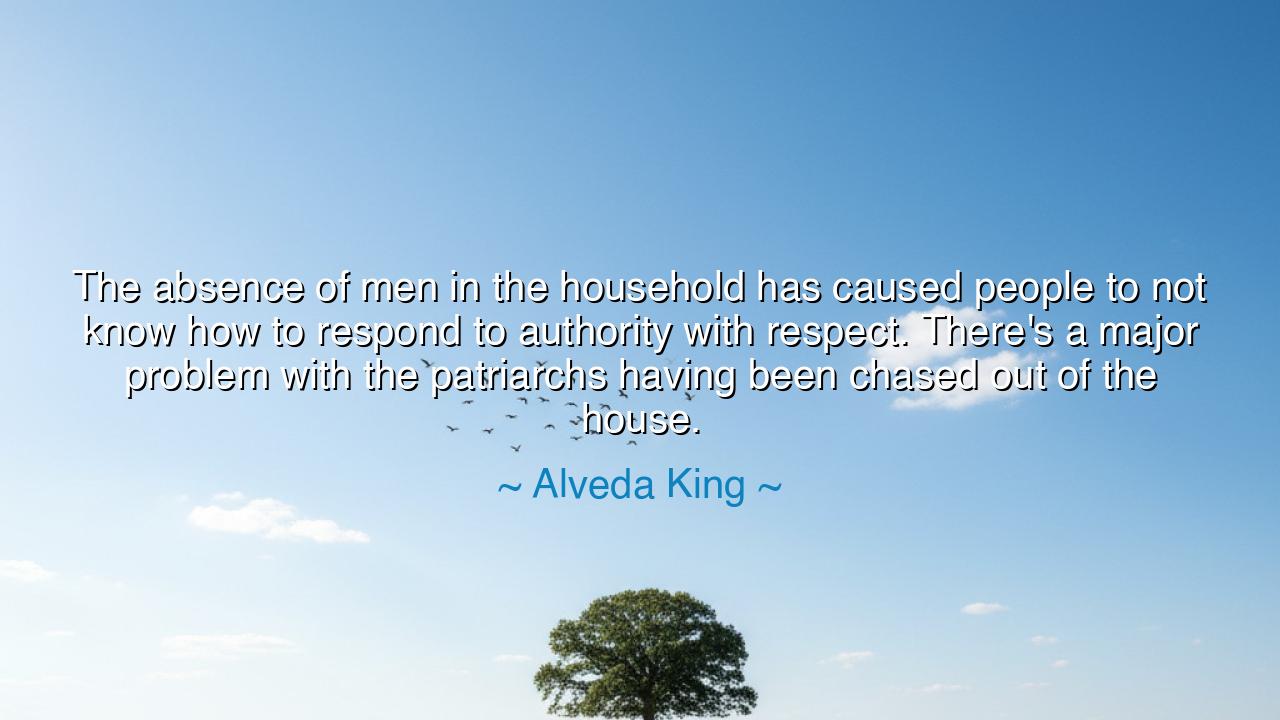
The absence of men in the household has caused people to not know
The absence of men in the household has caused people to not know how to respond to authority with respect. There's a major problem with the patriarchs having been chased out of the house.






In the words of Alveda King, a woman of faith and lineage, there rings a cry both sorrowful and wise: “The absence of men in the household has caused people to not know how to respond to authority with respect. There's a major problem with the patriarchs having been chased out of the house.” These are not idle words — they are a lament and a warning, born from generations of broken homes and silenced fathers. They call us to remember that when the patriarch — the guiding presence of the father — disappears, a sacred order is shaken. The foundation of discipline, reverence, and moral structure begins to crumble, and a society that forgets the strength of its fathers soon forgets how to honor any form of authority.
Alveda King, the niece of Martin Luther King Jr., speaks from both personal heritage and spiritual insight. She comes from a family where men stood as pillars — not tyrants, but protectors, teachers, and moral compasses. Her uncle, her father, her grandfather — all understood that to lead a family was not to rule it with force, but to anchor it with wisdom and love. When she speaks of the absence of men in the household, she speaks of more than a missing presence — she speaks of a wound in the heart of civilization. For the home is the first nation, and the father its first lawgiver. When that lawgiver vanishes, the sons grow without direction, the daughters without measure, and the family drifts like a ship without a captain upon the sea of modern confusion.
In every ancient culture, the father’s role was sacred. In the tribes of Israel, the patriarch blessed his children before his death, passing down the lineage of faith and strength. Among the Romans, the paterfamilias was the guardian of virtue and discipline. Even in the simplest villages, the father was the one who taught his children how to labor, how to speak with honor, how to bow before what is right. Yet in our time, says Alveda King, this chain has been broken — and with it, the natural reverence for order and respect. When a generation grows up without the steady hand of a father, it learns rebellion before it learns obedience, and confusion before it learns truth.
Consider the story of a nation that forgot its fathers. In the latter half of the 20th century, the family began to fracture. War took some; poverty took others; ideology and pride did the rest. As men drifted away — some by force, others by choice — the balance of the home was lost. Mothers stood strong, bearing burdens they were never meant to carry alone. But the father’s absence left a silence that no government program, no teacher, no screen could fill. The sons searched for strength and found it in anger; the daughters sought love and found it in uncertainty. And so the words of Alveda King are not a condemnation, but a plea — a call to restore what was lost, to bring the patriarchs back into the house, not as rulers of domination, but as fathers of virtue.
Yet King’s message is not merely for men — it is for all. For respect for authority begins at home, but it spreads outward: to teachers, to elders, to leaders, and to God. When children learn to honor their parents, they learn to honor wisdom itself. When they learn to obey truth, they learn to resist corruption. Without that early training — the discipline of the father’s word and the mother’s love — the world becomes a place of endless argument, where every voice demands to be heard, but no one listens. Thus, the home becomes the seed of civilization, and the father, though but one man, becomes the keeper of a generation’s moral flame.
There is a moment in Scripture, in the story of the prodigal son, where the father’s role shines as eternal truth. The son, lost in folly, returns home broken. And what does the father do? He does not condemn — he restores. This is the power of the patriarch: to guide without tyranny, to forgive without weakness, to stand as both teacher and protector. When such men fill the home, authority regains its dignity, and respect is no longer enforced by fear, but nurtured by example.
So, my children, take heed of Alveda King’s words. Honor the fathers, and call them back to their rightful place. Let not society shame men for being strong, nor women for honoring that strength. Let us rebuild our homes so that authority is not a curse, but a covenant — where fathers lead with virtue, mothers nurture with grace, and children rise in the light of discipline and love.
For a nation that forgets its fathers forgets its foundation. But a nation that restores the patriarch’s wisdom — tempered by humility, guided by justice, and rooted in love — shall rise again in strength. Let every household, then, become once more a sanctuary of order, a forge of character, a temple of respect. For when the father stands in the doorway once more, the home will cease to tremble, and the heart of the world will remember how to bow before what is right.






AAdministratorAdministrator
Welcome, honored guests. Please leave a comment, we will respond soon